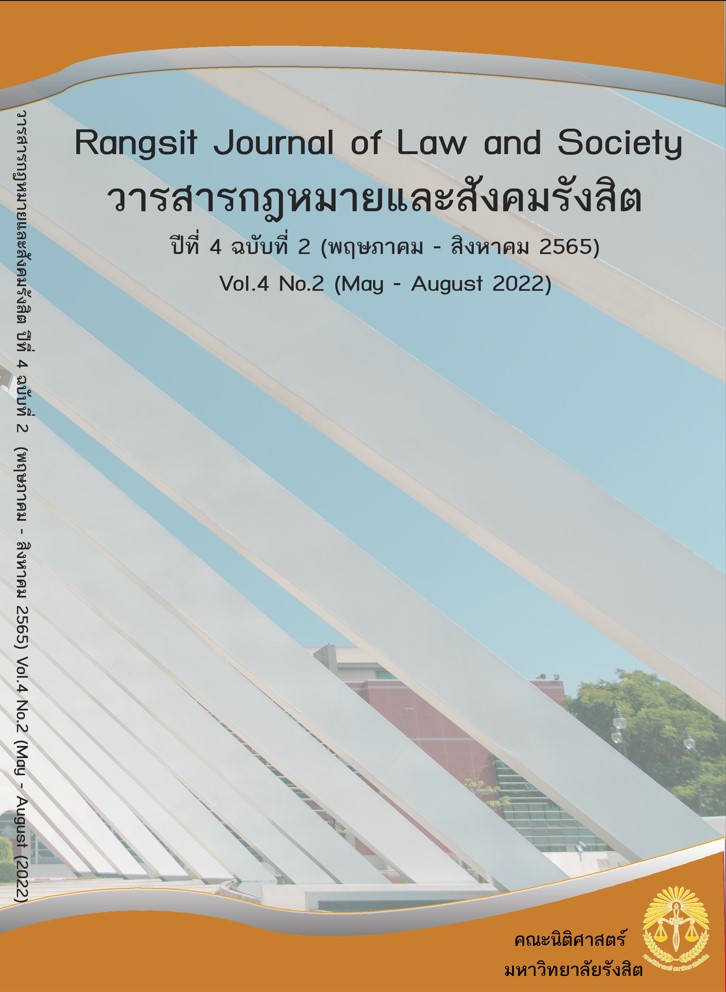มาตรการทางกฎหมายในการปลูกและการใช้กัญชา: กรณีประเทศอุรุกวัย
Main Article Content
บทคัดย่อ
กัญชาเป็นพืชเสพติดชนิดหนึ่ง มีชื่อทางวิทยาศาสตร์ว่า Cannabis Sativa subsp. Indica (Lam.) ซึ่งให้ทั้งคุณประโยชน์และโทษในขณะเดียวกัน ซึ่งจากรากฐานทางประวัติศาสตร์พบว่า กัญชาอยู่คู่มนุษยชาติมาอย่างยาวนานตั้งแต่ยุคโบราณก่อนสมัยคริสตกาล มีการปลูกและใช้กัญชามาอย่างยาวนาน เริ่มตั้งแต่การใช้เส้นใยในการทำสิ่งทอ ใช้บริโภคเป็นอาหาร เป็นยารักษาโรค ประกอบพิธีกรรมทางศาสนา รวมทั้งใช้เสพเพื่อนันทนาการ ซึ่งเป็นส่วนหนึ่งของวัฒนธรรมและวิถีชีวิตของมนุษย์มาตั้งแต่โบราณกาลทั้งในประเทศไทยและต่างประเทศ แต่โดยที่อนุสัญญาเดี่ยวว่าด้วยยาเสพติดให้โทษ ค.ศ.1961 (The Single Convention on Narcotic Drugs, 1961) ซึ่งเป็นกฎหมายระหว่างประเทศ จัดให้กัญชาเป็นยาเสพติดหรือสารเสพติด ประเภทที่ 1 และกำหนดให้รัฐภาคีสามารถนำไปใช้ประโยชน์เฉพาะวัตถุประสงค์ทางการแพทย์และในทางวิทยาศาสตร์ได้ภายใต้เงื่อนไขและหลักเกณฑ์ที่อนุสัญญากำหนด ไม่ว่าจะเป็นการเพาะปลูก การแปรรูป นำเข้า ส่งออกหรือแจกจ่าย โดยไม่รวมถึงการใช้เพื่อวัตถุประสงค์ในการนันทนาการ (Recreational Use)
ประเทศอุรุกวัย (Uruguay) เป็นประเทศแรกในโลกที่ออกกฎหมายกำหนดให้กัญชามีสถานะที่ถูกกฎหมายและสามารถใช้กัญชาเพื่อสันทนาการได้มาตั้งแต่ปี พ.ศ. 2556 เป็นเวลากว่าเก้าปีแล้ว โดยกฎหมาย Ley No. 19.172 อนุญาตให้ประชาชนสามารถปลูกกัญชาได้ครัวเรือนละหกต้น บุคคลอายุเกินกว่าสิบแปดปีบริบูรณ์สามารถขึ้นทะเบียนผู้เสพกัญชาได้ และสามารถซื้อขายกัญชาได้โดยผ่านร้านขายกัญชาที่ได้รับอนุญาต จึงสมควรที่จะมีการศึกษาและถอดบทเรียนการใช้กัญชาเพื่อการบริโภคในประเทศอุรุกวัยเพื่อใช้เป็นแนวทางในการควบคุมการปลูกและใช้กัญชาเพื่อการบริโภคให้เหมาะสมและสอดคล้องกับบริบทของประเทศไทย
Article Details

อนุญาตภายใต้เงื่อนไข Creative Commons Attribution-NonCommercial-NoDerivatives 4.0 International License.
เอกสารอ้างอิง
คนึงนิจ ศรีบัวเอี่ยม. (2561). รายงานสรุปผลสัมมนาและระดมสมอง เรื่อง กัญชาทางการแพทย์ (Medical Cannabis) กับกฎหมาย จากยาเสพติดสู่ยารักษาโรค. เรียกใช้เมื่อ 9 มิถุนายน 2565 จาก องค์การเภสัชกรรมและจุฬาลงกรณ์มหาวิทยาลัย: http://file:///C:/Users/lawdraft/Downloads/ReportMeeting2_Rev03.pdf
ธนัทเทพ เธียรประสิทธิ์. (2562). กฎหมายที่เกี่ยวกับการควบคุมพืชกัญชา: บทเรียนจากต่างแดน (Law regarding Cannabis: The Overseas Experience). วารสานนิติพัฒน์นิด้า, 8(2), 45-62.
สมยศ เชื้อไทย. (2559). นิติปรัชญาเบื้องต้น. กรุงเทพมหานคร: มหาวิทยาลัยธรรมศาสตร์. 154.
สำนักงานคณะกรรมการอาหารและยา. (5 ธันวาคม 2563). ยูเอ็น (UN) ไม่ได้ปลดกัญชาออกจากยาเสพติด แค่ให้ใช้ประโยชน์ทางการแพทย์เพิ่มขึ้น. เรียกใช้เมื่อ 9 June 2022 จาก https://gnews.apps.go.th/news?news=73961
Dicey, A.V. (1885). Introduction to the Study of the Law of the Constitution. Retrieved June 9, 2022, from LIBERTY FUND: https://files.libertyfund.org/files/1714/0125_Bk.pdf
Fuller, L. L. (1969). The Morality of Law: Revised Edition. Retrieved June 9, 2022, from JSTOR: https://www.jstor.org/stable/j.ctt1cc2mds
Presidencia. (2014). Uruguay Law “ley No. 19. 172” Chapter v. Violations and Penalties. Retrieved June 9, 2022, from https://medios.presidencia.gub.uy/jm_portal/2014/noticias/NO_M871/reglamentacion-ley19172.pdf
Roscoe Pound. (1912). The Scope and Purpose of Sociological Jurisprudence. United States of America: Harvard Law. 514-516.
Single Convention on Narcotic Drugs. (1961). Retrieved June 9, 2022, from UNITED NATIONS: https://www.unodc.org/pdf/convention_1961_en.pdf
The 1972 Protocol amending the Single Convention on Narcotic Drugs. (1961). Retrieved June 9, 2022, from World Health Organization: https://www.who.int/data/gho/indicator-metadata-registry/imr-details/3383

